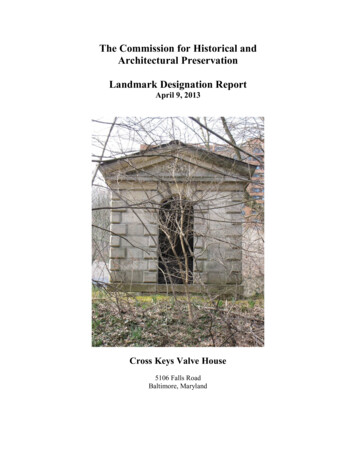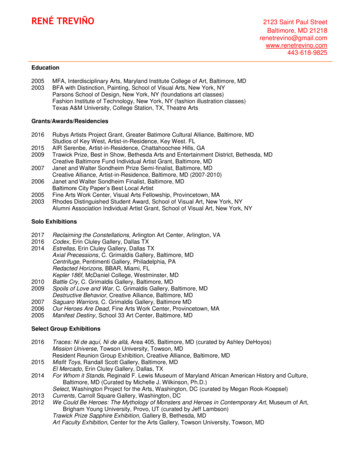
Transcription
The Awakeningand Selected Short StoriesbyKate ChopinA PENN STATEELECTRONIC CLASSICS SERIESPUBLICATION
The Awakening and Selected Short Stories by Kate Chopinis a publication of the Pennsylvania State University.This Portable Document File is furnished free andwithout any charge of any kind. Any person using thisdocument file, for any purpose, and in any way does soat his or her own risk. Neither the Pennsylvania StateUniversity nor Jim Manis, Faculty Editor, nor anyoneassociated with the Pennsylvania State University assumes any responsibility for the material containedwithin the document or for the file as an electronictransmission, in any way.The Awakening and Selected Short Stories by Kate Chopin,the Pennsylvania State University, Electronic ClassicsSeries, Jim Manis, Faculty Editor, Hazleton, PA 182021291 is a Portable Document File produced as part of anongoing student publication project to bring classicalworks of literature, in English, to free and easy access ofthose wishing to make use of them.Cover Design: Jim ManisCopyright 2008 The Pennsylvania State UniversityThe Pennsylvania State University is an equal opportunity university.
Kate Chopin (born Katherine O'Flaherty on February 8, 1850 –August 22, 1904) was an American author of short stories and novels,mostly of a Louisiana Creole background. She is now considered tohave been a forerunner of feminist authors of the 20th century.—Courtesy Wikipedia.org
ContentsTHE AWAKENING . 5Beyond the Bayou . 122Ma’ame Pelagie . 128Desiree’s Baby . 136A Respectable Woman . 141The Kiss . 145A Pair of Silk Stockings . 148The Locket . 153A Reflection . 158
Kate ChopinThe Awakeningand Selected Short StoriesbyKate ChopinTHE AWAKENINGIA GREEN AND YELLOW PARROT, which hung in a cage outside the door, keptrepeating over and over:“Allez vous-en! Allez vous-en! Sapristi! That’s all right!”He could speak a little Spanish, and also a language which nobodyunderstood, unless it was the mocking-bird that hung on the other side ofthe door, whistling his fluty notes out upon the breeze with maddeningpersistence.Mr. Pontellier, unable to read his newspaper with any degree of comfort, arose with an expression and an exclamation of disgust.He walked down the gallery and across the narrow “bridges” whichconnected the Lebrun cottages one with the other. He had been seatedbefore the door of the main house. The parrot and the mockingbird werethe property of Madame Lebrun, and they had the right to make all thenoise they wished. Mr. Pontellier had the privilege of quitting their society when they ceased to be entertaining.5
The AwakeningHe stopped before the door of his own cottage, which was the fourthone from the main building and next to the last. Seating himself in awicker rocker which was there, he once more applied himself to the taskof reading the newspaper. The day was Sunday; the paper was a day old.The Sunday papers had not yet reached Grand Isle. He was already acquainted with the market reports, and he glanced restlessly over the editorials and bits of news which he had not had time to read before quittingNew Orleans the day before.Mr. Pontellier wore eye-glasses. He was a man of forty, of medium heightand rather slender build; he stooped a little. His hair was brown and straight,parted on one side. His beard was neatly and closely trimmed.Once in a while he withdrew his glance from the newspaper and lookedabout him. There was more noise than ever over at the house. The mainbuilding was called “the house,” to distinguish it from the cottages. Thechattering and whistling birds were still at it. Two young girls, the Farivaltwins, were playing a duet from “Zampa” upon the piano. Madame Lebrunwas bustling in and out, giving orders in a high key to a yard-boy whenever she got inside the house, and directions in an equally high voice to adining-room servant whenever she got outside. She was a fresh, prettywoman, clad always in white with elbow sleeves. Her starched skirts crinkledas she came and went. Farther down, before one of the cottages, a lady inblack was walking demurely up and down, telling her beads. A good manypersons of the pension had gone over to the Cheniere Caminada inBeaudelet’s lugger to hear mass. Some young people were out under thewateroaks playing croquet. Mr. Pontellier’s two children were there sturdylittle fellows of four and five. A quadroon nurse followed them about witha faraway, meditative air.Mr. Pontellier finally lit a cigar and began to smoke, letting the paperdrag idly from his hand. He fixed his gaze upon a white sunshade that wasadvancing at snail’s pace from the beach. He could see it plainly betweenthe gaunt trunks of the water-oaks and across the stretch of yellow camomile. The gulf looked far away, melting hazily into the blue of the horizon. The sunshade continued to approach slowly. Beneath its pink-linedshelter were his wife, Mrs. Pontellier, and young Robert Lebrun. Whenthey reached the cottage, the two seated themselves with some appearanceof fatigue upon the upper step of the porch, facing each other, each leaning against a supporting post.“What folly! to bathe at such an hour in such heat!” exclaimed Mr.Pontellier. He himself had taken a plunge at daylight. That was why themorning seemed long to him.6
Kate Chopin“You are burnt beyond recognition,” he added, looking at his wife asone looks at a valuable piece of personal property which has suffered somedamage. She held up her hands, strong, shapely hands, and surveyed themcritically, drawing up her fawn sleeves above the wrists. Looking at themreminded her of her rings, which she had given to her husband beforeleaving for the beach. She silently reached out to him, and he, understanding, took the rings from his vest pocket and dropped them into heropen palm. She slipped them upon her fingers; then clasping her knees,she looked across at Robert and began to laugh. The rings sparkled uponher fingers. He sent back an answering smile.“What is it?” asked Pontellier, looking lazily and amused from one tothe other. It was some utter nonsense; some adventure out there in thewater, and they both tried to relate it at once. It did not seem half soamusing when told. They realized this, and so did Mr. Pontellier. He yawnedand stretched himself. Then he got up, saying he had half a mind to goover to Klein’s hotel and play a game of billiards.“Come go along, Lebrun,” he proposed to Robert. But Robert admitted quite frankly that he preferred to stay where he was and talk to Mrs.Pontellier.“Well, send him about his business when he bores you, Edna,” instructedher husband as he prepared to leave.“Here, take the umbrella,” she exclaimed, holding it out to him. Heaccepted the sunshade, and lifting it over his head descended the steps andwalked away.“Coming back to dinner?” his wife called after him. He halted a moment and shrugged his shoulders. He felt in his vest pocket; there was aten-dollar bill there. He did not know; perhaps he would return for theearly dinner and perhaps he would not. It all depended upon the company which he found over at Klein’s and the size of “the game.” He didnot say this, but she understood it, and laughed, nodding good-by tohim.Both children wanted to follow their father when they saw him startingout. He kissed them and promised to bring them back bonbons and peanuts.7
The AwakeningIIMRS. PONTELLIER’S EYES were quick and bright; they were a yellowish brown,about the color of her hair. She had a way of turning them swiftly upon anobject and holding them there as if lost in some inward maze of contemplation or thought.Her eyebrows were a shade darker than her hair. They were thick andalmost horizontal, emphasizing the depth of her eyes. She was rather handsome than beautiful. Her face was captivating by reason of a certain frankness of expression and a contradictory subtle play of features. Her mannerwas engaging.Robert rolled a cigarette. He smoked cigarettes because he could notafford cigars, he said. He had a cigar in his pocket which Mr. Pontellierhad presented him with, and he was saving it for his after-dinner smoke.This seemed quite proper and natural on his part. In coloring he wasnot unlike his companion. A clean-shaved face made the resemblance morepronounced than it would otherwise have been. There rested no shadowof care upon his open countenance. His eyes gathered in and reflected thelight and languor of the summer day.Mrs. Pontellier reached over for a palm-leaf fan that lay on the porchand began to fan herself, while Robert sent between his lips light puffsfrom his cigarette. They chatted incessantly: about the things around them;their amusing adventure out in the water-it had again assumed its entertaining aspect; about the wind, the trees, the people who had gone to theCheniere; about the children playing croquet under the oaks, and theFarival twins, who were now performing the overture to “The Poet andthe Peasant.”Robert talked a good deal about himself. He was very young, and didnot know any better. Mrs. Pontellier talked a little about herself for thesame reason. Each was interested in what the other said. Robert spoke ofhis intention to go to Mexico in the autumn, where fortune awaited him.He was always intending to go to Mexico, but some way never got there.Meanwhile he held on to his modest position in a mercantile house inNew Orleans, where an equal familiarity with English, French and Spanish gave him no small value as a clerk and correspondent.He was spending his summer vacation, as he always did, with his mother8
Kate Chopinat Grand Isle. In former times, before Robert could remember, “the house”had been a summer luxury of the Lebruns. Now, flanked by its dozen ormore cottages, which were always filled with exclusive visitors from the“Quartier Francais,” it enabled Madame Lebrun to maintain the easy andcomfortable existence which appeared to be her birthright.Mrs. Pontellier talked about her father’s Mississippi plantation and hergirlhood home in the old Kentucky bluegrass country. She was an Americanwoman, with a small infusion of French which seemed to have been lost indilution. She read a letter from her sister, who was away in the East, andwho had engaged herself to be married. Robert was interested, and wantedto know what manner of girls the sisters were, what the father was like, andhow long the mother had been dead.When Mrs. Pontellier folded the letter it was time for her to dress forthe early dinner.“I see Leonce isn’t coming back,” she said, with a glance in the directionwhence her husband had disappeared. Robert supposed he was not, as therewere a good many New Orleans club men over at Klein’s.When Mrs. Pontellier left him to enter her room, the young man descended the steps and strolled over toward the croquet players, where,during the half-hour before dinner, he amused himself with the littlePontellier children, who were very fond of him.IIIIT WAS ELEVEN O’CLOCK that night when Mr. Pontellier returned from Klein’shotel. He was in an excellent humor, in high spirits, and very talkative.His entrance awoke his wife, who was in bed and fast asleep when he camein. He talked to her while he undressed, telling her anecdotes and bits ofnews and gossip that he had gathered during the day. From his trouserspockets he took a fistful of crumpled bank notes and a good deal of silvercoin, which he piled on the bureau indiscriminately with keys, knife, handkerchief, and whatever else happened to be in his pockets. She was overcome with sleep, and answered him with little half utterances.He thought it very discouraging that his wife, who was the sole objectof his existence, evinced so little interest in things which concerned him,and valued so little his conversation.Mr. Pontellier had forgotten the bonbons and peanuts for the boys.9
The AwakeningNotwithstanding he loved them very much, and went into the adjoiningroom where they slept to take a look at them and make sure that they wereresting comfortably. The result of his investigation was far from satisfactory. He turned and shifted the youngsters about in bed. One of thembegan to kick and talk about a basket full of crabs.MR. PONTELLIER RETURNED to his wife with the information that Raoulhad a high fever and needed looking after. Then he lit a cigar and wentand sat near the open door to smoke it.Mrs. Pontellier was quite sure Raoul had no fever. He had gone to bedperfectly well, she said, and nothing had ailed him all day. Mr. Pontellierwas too well acquainted with fever symptoms to be mistaken. He assuredher the child was consuming at that moment in the next room.He reproached his wife with her inattention, her habitual neglect of thechildren. If it was not a mother’s place to look after children, whose onearth was it? He himself had his hands full with his brokerage business.He could not be in two places at once; making a living for his family onthe street, and staying at home to see that no harm befell them. He talkedin a monotonous, insistent way.Mrs. Pontellier sprang out of bed and went into the next room. Shesoon came back and sat on the edge of the bed, leaning her head down onthe pillow. She said nothing, and refused to answer her husband when hequestioned her. When his cigar was smoked out he went to bed, and inhalf a minute he was fast asleep.Mrs. Pontellier was by that time thoroughly awake. She began to cry alittle, and wiped her eyes on the sleeve of her peignoir. Blowing out thecandle, which her husband had left burning, she slipped her bare feet intoa pair of satin mules at the foot of the bed and went out on the porch,where she sat down in the wicker chair and began to rock gently to andfro.It was then past midnight. The cottages were all dark. A single faintlight gleamed out from the hallway of the house. There was no soundabroad except the hooting of an old owl in the top of a water-oak, and theeverlasting voice of the sea, that was not uplifted at that soft hour. It brokelike a mournful lullaby upon the night.The tears came so fast to Mrs. Pontellier’s eyes that the damp sleeve ofher peignoir no longer served to dry them. She was holding the back ofher chair with one hand; her loose sleeve had slipped almost to the shoulder of her uplifted arm. Turning, she thrust her face, steaming and wet,into the bend of her arm, and she went on crying there, not caring any10
Kate Chopinlonger to dry her face, her eyes, her arms. She could not have told why shewas crying. Such experiences as the foregoing were not uncommon in hermarried life. They seemed never before to have weighed much against theabundance of her husband’s kindness and a uniform devotion which hadcome to be tacit and self-understood.An indescribable oppression, which seemed to generate in some unfamiliar part of her consciousness, filled her whole being with a vague anguish. It was like a shadow, like a mist passing across her soul’s summerday. It was strange and unfamiliar; it was a mood. She did not sit thereinwardly upbraiding her husband, lamenting at Fate, which had directedher footsteps to the path which they had taken. She was just having agood cry all to herself. The mosquitoes made merry over her, biting herfirm, round arms and nipping at her bare insteps.The little stinging, buzzing imps succeeded in dispelling a mood whichmight have held her there in the darkness half a night longer.The following morning Mr. Pontellier was up in good time to take therockaway which was to convey him to the steamer at the wharf. He wasreturning to the city to his business, and they would not see him again atthe Island till the coming Saturday. He had regained his composure, whichseemed to have been somewhat impaired the night before. He was eagerto be gone, as he looked forward to a lively week in Carondelet Street.Mr. Pontellier gave his wife half of the money which he had broughtaway from Klein’s hotel the evening before. She liked money as well asmost women, and, accepted it with no little satisfaction.“It will buy a handsome wedding present for Sister Janet!” she exclaimed,smoothing out the bills as she counted them one by one.“Oh! we’ll treat Sister Janet better than that, my dear,” he laughed, as heprepared to kiss her good-by.The boys were tumbling about, clinging to his legs, imploring that numerous things be brought back to them. Mr. Pontellier was a great favorite, and ladies, men, children, even nurses, were always on hand to saygoodby to him. His wife stood smiling and waving, the boys shouting, ashe disappeared in the old rockaway down the sandy road.A few days later a box arrived for Mrs. Pontellier from New Orleans. Itwas from her husband. It was filled with friandises, with luscious andtoothsome bits—the finest of fruits, pates, a rare bottle or two, delicioussyrups, and bonbons in abundance.Mrs. Pontellier was always very generous with the contents of such abox; she was quite used to receiving them when away from home. Thepates and fruit were brought to the dining-room; the bonbons were passed11
The Awakeningaround. And the ladies, selecting with dainty and discriminating fingersand a little greedily, all declared that Mr. Pontellier was the best husbandin the world. Mrs. Pontellier was forced to admit that she knew of nonebetter.IVIT WOULD HAVE BEEN a difficult matter for Mr. Pontellier to define to hisown satisfaction or any one else’s wherein his wife failed in her duty toward their children. It was something which he felt rather than perceived,and he never voiced the feeling without subsequent regret and ample atonement.If one of the little Pontellier boys took a tumble whilst at play, he wasnot apt to rush crying to his mother’s arms for comfort; he would morelikely pick himself up, wipe the water out of his eves and the sand out of hismouth, and go on playing. Tots as they were, they pulled together and stoodtheir ground in childish battles with doubled fists and uplifted voices, whichusually prevailed against the other mother-tots. The quadroon nurse waslooked upon as a huge encumbrance, only good to button up waists andpanties and to brush and part hair; since it seemed to be a law of society thathair must be parted and brushed.In short, Mrs. Pontellier was not a mother-woman. The motherwomenseemed to prevail that summer at Grand Isle. It was easy to know them,fluttering about with extended, protecting wings when any harm, real orimaginary, threatened their precious brood. They were women who idolized their children, worshiped their husbands, and esteemed it a holy privilege to efface themselves as individuals and grow wings as ministeringangels.Many of them were delicious in the role; one of them was the embodiment of every womanly grace and charm. If her husband did not adoreher, he was a brute, deserving of death by slow torture. Her name wasAdele Ratignolle. There are no words to describe her save the old ones thathave served so often to picture the bygone heroine of romance and the fairlady of our dreams. There was nothing subtle or hidden about her charms;her beauty was all there, flaming and apparent: the spun-gold hair thatcomb nor confining pin could restrain; the blue eyes that were like nothing but sapphires; two lips that pouted, that were so red one could only12
Kate Chopinthink of cherries or some other delicious crimson fruit in looking at them.She was growing a little stout, but it did not seem to detract an iota fromthe grace of every step, pose, gesture. One would not have wanted herwhite neck a mite less full or her beautiful arms more slender. Never werehands more exquisite than hers, and it was a joy to look at them when shethreaded her needle or adjusted her gold thimble to her taper middle finger as she sewed away on the little night-drawers or fashioned a bodice ora bib.Madame Ratignolle was very fond of Mrs. Pontellier, and often shetook her sewing and went over to sit with her in the afternoons. She wassitting there the afternoon of the day the box arrived from New Orleans.She had possession of the rocker, and she was busily engaged in sewingupon a diminutive pair of night-drawers.She had brought the pattern of the drawers for Mrs. Pontellier to cutout—a marvel of construction, fashioned to enclose a baby’s body so effectually that only two small eyes might look out from the garment, likean Eskimo’s. They were designed for winter wear, when treacherous draftscame down chimneys and insidious currents of deadly cold found theirway through key-holes.Mrs. Pontellier’s mind was quite at rest concerning the present materialneeds of her children, and she could not see the use of anticipating andmaking winter night garments the subject of her summer meditations.But she did not want to appear unamiable and uninterested, so she hadbrought forth newspapers, which she spread upon the floor of the gallery,and under Madame Ratignolle’s directions she had cut a pattern of theimpervious garment.Robert was there, seated as he had been the Sunday before, and Mrs.Pontellier also occupied her former position on the upper step, leaninglistlessly against the post. Beside her was a box of bonbons, which she heldout at intervals to Madame Ratignolle.That lady seemed at a loss to make a selection, but finally settled upona stick of nougat, wondering if it were not too rich; whether it couldpossibly hurt her. Madame Ratignolle had been married seven years. Aboutevery two years she had a baby. At that time she had three babies, and wasbeginning to think of a fourth one. She was always talking about her“condition.” Her “condition” was in no way apparent, and no one wouldhave known a thing about it but for her persistence in making it the subject of conversation.Robert started to reassure her, asserting that he had known a lady whohad subsisted upon nougat during the entire—but seeing the color mount13
The Awakeninginto Mrs. Pontellier’s face he checked himself and changed the subject.Mrs. Pontellier, though she had married a Creole, was not thoroughlyat home in the society of Creoles; never before had she been thrown sointimately among them. There were only Creoles that summer at Lebrun’s.They all knew each other, and felt like one large family, among whomexisted the most amicable relations. A characteristic which distinguishedthem and which impressed Mrs. Pontellier most forcibly was their entireabsence of prudery. Their freedom of expression was at first incomprehensible to her, though she had no difficulty in reconciling it with a loftychastity which in the Creole woman seems to be inborn and unmistakable.Never would Edna Pontellier forget the shock with which she heardMadame Ratignolle relating to old Monsieur Farival the harrowing storyof one of her accouchements, withholding no intimate detail. She wasgrowing accustomed to like shocks, but she could not keep the mountingcolor back from her cheeks. Oftener than once her coming had interrupted the droll story with which Robert was entertaining some amusedgroup of married women.A book had gone the rounds of the pension. When it came her turn toread it, she did so with profound astonishment. She felt moved to read thebook in secret and solitude, though none of the others had done so,—tohide it from view at the sound of approaching footsteps. It was openlycriticised and freely discussed at table. Mrs. Pontellier gave over beingastonished, and concluded that wonders would never cease.VThey formed a congenial group sitting there that summer afternoon—Madame Ratignolle sewing away, often stopping to relate a story or incident with much expressive gesture of her perfect hands; Robert and Mrs.Pontellier sitting idle, exchanging occasional words, glances or smiles whichindicated a certain advanced stage of intimacy and camaraderie.He had lived in her shadow during the past month. No one thoughtanything of it. Many had predicted that Robert would devote himself toMrs. Pontellier when he arrived. Since the age of fifteen, which was elevenyears before, Robert each summer at Grand Isle had constituted himselfthe devoted attendant of some fair dame or damsel. Sometimes it was a14
Kate Chopinyoung girl, again a widow; but as often as not it was some interestingmarried woman.For two consecutive seasons he lived in the sunlight of MademoiselleDuvigne’s presence. But she died between summers; then Robert posed as aninconsolable, prostrating himself at the feet of Madame Ratignolle for whatever crumbs of sympathy and comfort she might be pleased to vouchsafe.Mrs. Pontellier liked to sit and gaze at her fair companion as she mightlook upon a faultless Madonna.“Could any one fathom the cruelty beneath that fair exterior?” murmured Robert. “She knew that I adored her once, and she let me adoreher. It was ‘Robert, come; go; stand up; sit down; do this; do that; see ifthe baby sleeps; my thimble, please, that I left God knows where. Comeand read Daudet to me while I sew.’”“Par exemple! I never had to ask. You were always there under my feet,like a troublesome cat.”“You mean like an adoring dog. And just as soon as Ratignolle appeared onthe scene, then it was like a dog. ‘Passez! Adieu! Allez vous-en!’”“Perhaps I feared to make Alphonse jealous,” she interjoined, with excessive naivete. That made them all laugh. The right hand jealous of theleft! The heart jealous of the soul! But for that matter, the Creole husbandis never jealous; with him the gangrene passion is one which has becomedwarfed by disuse.Meanwhile Robert, addressing Mrs Pontellier, continued to tell of hisone time hopeless passion for Madame Ratignolle; of sleepless nights, ofconsuming flames till the very sea sizzled when he took his daily plunge.While the lady at the needle kept up a little running, contemptuous comment:“Blagueur—farceur—gros bete, va!”He never assumed this seriocomic tone when alone with Mrs. Pontellier.She never knew precisely what to make of it; at that moment it was impossible for her to guess how much of it was jest and what proportion wasearnest. It was understood that he had often spoken words of love to Madame Ratignolle, without any thought of being taken seriously. Mrs.Pontellier was glad he had not assumed a similar role toward herself. Itwould have been unacceptable and annoying.Mrs. Pontellier had brought her sketching materials, which she sometimesdabbled with in an unprofessional way. She liked the dabbling. She felt in itsatisfaction of a kind which no other employment afforded her.She had long wished to try herself on Madame Ratignolle. Never hadthat lady seemed a more tempting subject than at that moment, seated15
The Awakeningthere like some sensuous Madonna, with the gleam of the fading day enriching her splendid color.Robert crossed over and seated himself upon the step below Mrs.Pontellier, that he might watch her work. She handled her brushes with acertain ease and freedom which came, not from long and close acquaintance with them, but from a natural aptitude. Robert followed her workwith close attention, giving forth little ejaculatory expressions of appreciation in French, which he addressed to Madame Ratignolle.“Mais ce n’est pas mal! Elle s’y connait, elle a de la force, oui.”During his oblivious attention he once quietly rested his head against Mrs.Pontellier’s arm. As gently she repulsed him. Once again he repeated the offense. She could not but believe it to be thoughtlessness on his part; yet thatwas no reason she should submit to it. She did not remonstrate, except againto repulse him quietly but firmly. He offered no apology. The picture completed bore no resemblance to Madame Ratignolle. She was greatly disappointed to find that it did not look like her. But it was a fair enough piece ofwork, and in many respects satisfying.Mrs. Pontellier evidently did not think so. After surveying the sketchcritically she drew a broad smudge of paint across its surface, and crumpledthe paper between her hands.The youngsters came tumbling up the steps, the quadroon following atthe respectful distance which they required her to observe. Mrs. Pontelliermade them carry her paints and things into the house. She sought todetain them for a little talk and some pleasantry. But they were greatly inearnest. They had only come to investigate the contents of the bonbonbox. They accepted without murmuring what she chose to give them,each holding out two chubby hands scoop-like, in the vain hope that theymight be filled; and then away they went.The sun was low in the west, and the breeze soft and languorous thatcame up from the south, charged with the seductive odor of the sea. Children freshly befurbelowed, were gathering for their games under the oaks.Their voices were high and penetrating.Madame Ratignolle folded her sewing, placing thimble, scissors, andthread all neatly together in the roll, which she pinned securely. She complained of faintness. Mrs. Pontellier flew for the cologne water and a fan.She bathed Madame Ratignolle’s face with cologne, while Robert pliedthe fan with unnecessary vigor.The spell was soon over, and Mrs. Pontellier could not help wonderingif there were not a little imagination responsible for its origin, for the rosetint had never faded from her friend’s face.16
Kate ChopinShe stood watching the fair woman walk down the long line of gallerieswith the grace and majesty which queens are sometimes supposed to possess. Her little ones ran to meet her. Two of them clung about her whiteskirts, the third she took from its nurse and with a thousand endearmentsbore it along in her own fond, encircling arms. Though, as everybody wellknew, the doctor had forbidden her to lift so much as a pin!“Are y
The Awakening and Selected Short Stories by Kate Chopin, the Pennsylvania State University, Electronic Classics Series, Jim Manis, Faculty Editor, Hazleton, PA 18202-1291 is a Portable Document File produced as part of an ongoing student publication project to bring classical works of literature










